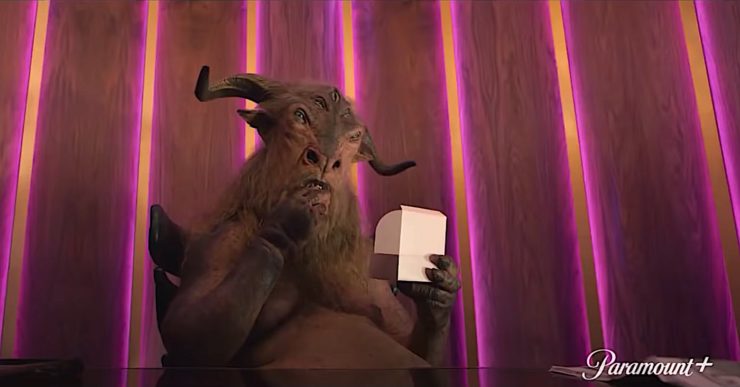Last season on Evil, the show introduced a beautifully effective framing device: a pop-up alphabet book, in which each letter stood for something absolutely terrifying, This season they’ve kept the pop-up book format, but instead of letters each entry is a different type of demon, e.g.: The Demon of Cults, The Demon of Memes, The Demon of Sex. Each episode explores its demons in surprising ways (the Demon of Sex is preying on a pair of virginal newlyweds who are still figuring things out; the Demon of Memes is using Google Streetview to spread an urban legend) while also checking in on the various dramas of our characters (Kristen is still dealing with the fallout from her violence and her confession to David; David is wrestling with his new status as a priest; Ben keeps falling into bed with women he should stay the heck away from). But all of this is nothing more than barest plot synopsis. Surely if you’re a fan of Evil—as you should be—your only question is: was this season as delightfully unhinged as usual?
Oh yes, dear reader. This season murdered every hinge, brought it back from the dead, and then murdered it again.
There is not a hinge in sight.
As with previous recaps of this show, I’m going to try to keep this as non-spoiler as possible. If I need to talk about something more in-depth I’ll warn you.
We begin at the end, with the season opener, “The Demon of Death”, involving an experiment to weigh people as they die to see if there’s any inexplicable weight loss, like if a soul were exiting the body, say. As ever the fun of the show comes from a few directions: the set-up is ludicrously over the top, with the experiment taking place in an airplane hangar, a hi-tech coffin that’s calibrated to weight the dying person, dozens of strings of lights that are meant to go from red to green, but keep shorting out and acting unpredictably, Ben and Kristen being relentlessly snarky while David tries to be solemn in the face of death, the strong implication that a demon is afoot, Leland is there for some reason, and, best of all, Wallace fuckin’ Shawn as one of the participants.
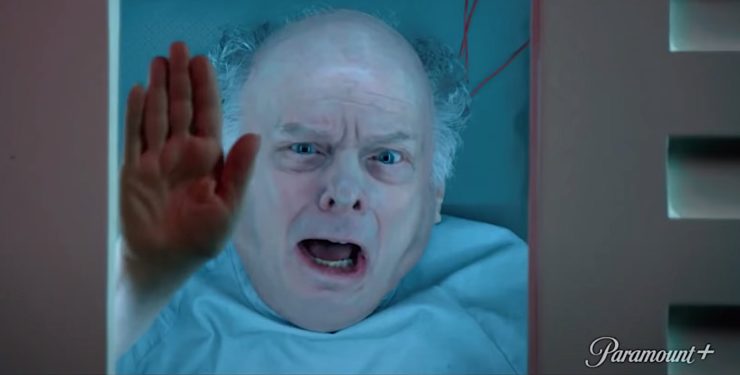
“The Demon of Memes” concerns a new urban legend running rampant among Kristen’s daughters’ friends. This one concerns an entity called Visiting Jack, and as with last season’s Elevator Game, the writers understand how kids think. When a someone is cursed, they have to enact seven steps (they call them “licks”) to free themselves. Some of the steps are predictable teen hazing: chug alcohol, have sex, etc. But step one is hilariously weird, and tailored to the Catholic schoolkids it’s targeting: go to confession and shout, “Captain Kirk is Christ!” and then bolt before the priest catches you. It’s perfect: sacrilegious…kinda, it’s a pop culture reference that a kid can understand, but not one you need to be 13 to get (or that will already be dated by the end of the season), it’s silly, it’s utterly inexplicable. Why Captain Kirk? Who invented these rules?
“The Demon of the Road” gives us a classic folktale about a haunted highway, but with a modern twist, “The Demon of Algorithms” gets into the evils of cryptocurrency and social media, and “The Demon of Cults” gently pokes the lines between “religion” and “cult” with Ben Shakir, as usual, pointing out that that line doesn’t exist. “The Angel of Warning” goes in a different direction. Why is it that when David has visions, he only sees white angels? And then in the last two episodes of the season it becomes clear that Kristen’s neighbor’s house might be hosting a demon infestation that’s spilling over into the Bouchards’ home, as well. As if they don’t have enough to deal with.
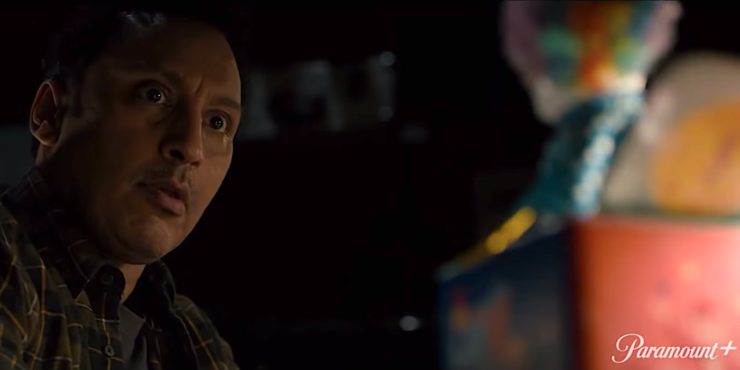
Looping around all of these issues are the team’s Cases of the Week—a trucker who thinks he’s possessed, a young man who needs an exorcism, the newlywed couple who need marriage counseling in addition to maybe some supernatural intervention, a single mom whose kids are being harassed by demons at night…maybe, a stock tip that turns people lives into a hybrid of Ringu and It Follows, and my favorite: THE HAUNTED TOY SHOP. And, looping around the cases, this season’s big overarching plots only get more tangled and fucked up.
Leland Townsend is doing everything he can to infiltrate the diocese, harass Kristen’s daughters (especially Lexy), and, now, target Kristen’s therapist Kurt Boggs. Kurt meanwhile gets a hilarious arc of his own when he decides to embark on a spiritual memoir titled From Bali to Queens. Sister Andrea gets more to do than just clean up after the priests. Sheryl rejoins the workforce with mixed results. Kristen and Andy…well, Kristen and Andy are Kristen and Andy.
But again, even that isn’t the heart of the show. The reason Evil is so great is that it’s created its own skewed world where people can get between any two boroughs of New York City in less than 20 minutes, and run Upstate and back for a case without hitting traffic on the Tappan Zee. If you wake up from a night terror at 11:30 and call your priest friend, he’s not just awake but perfectly dressed in a CBS-issue turtleneck, and happy to come over to your house for a talk. It’s a world where literally everyone seems willing to dip their toe in Satanism and see how it goes. It’s a world where a family of six lives with one bathroom, and the four daughters of the family haven’t murdered each other with blow dryers yet.

It’s a show where people have deep, passionate conversations about faith, science, rationality, and the meaning of love. Where an elderly nun and a 40-something agnostic can find mutual respect and express it by exchanging “sister” and “doctor” in amused tones. And that’s another important thing—I think this might be the funniest season so far? I laughed out loud at many, many scenes this time. (Pretty much any time Kurt was onscreen is GOLD.) Sheryl stars in a running gag about shortbread that I’m assuming is the darkest imaginable riff on Ted Lasso. Kristen’s found a new brand of canned margarita, and she’s started putting Pop Rocks on the rim of the glass when she drinks them! (When she bothers to pour them into a glass. FUCK I love Kristen.) Leland reads The Coming Civil War and giggles maniacally! And not to be stuck on this bathroom thing but there’s a haunted toilet?

This is a perfect television show.
A handful of quotes:
- Leland, talking about working for “The Father Below”: “…[internet] trolls are the knights on the Father’s chessboard.”
- Laura: “Ben the Magnificent, you are falling apart!”
- Leland: “You know how many translations of Dante’s Inferno there are? 134! You want to know how many of Paradiso? Twelve.”
- Ben (on a particular haunting): “OK, so, it’s The Ring. The supernatural world is watching movies…and basing their rules on a B-movie.”
Kristen: “Hang on, that is NOT a B-movie!”
Now let me get into a few things that might be too spoiler-y, so skip down five paragraphs if you haven’t watched yet!
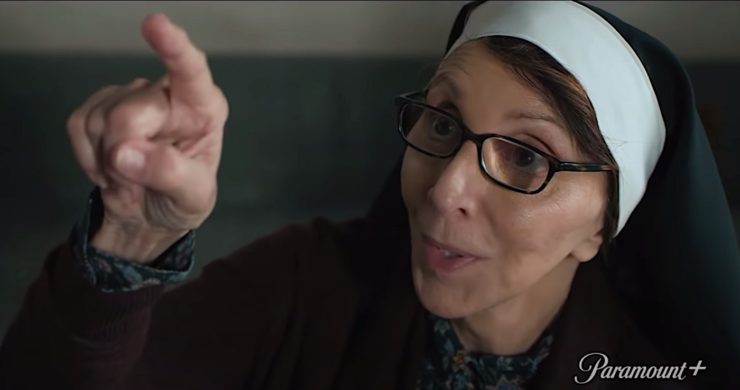
One of the truly great things about Evil is the way they layer tiny details that take something that could be banal or rote, and instead add a wholly unique angle. For instance, in “The Demon of the Road”, the main story is that a trucker thinks he’s possessed after driving a stretch of “haunted highway”—classic American folk horror. But it’s not a ghostly hitchhiker that’s messing with him—it’s a demonic cult member using drones and radio interference to terrify exhausted drivers. So we’ve got: modern tech making ancient horror real; a continuation of Evil’s Big Bad, the network of demonic cults that are afflicting society; a subtle commentary on labor in the U.S., as the only reason the man is susceptible to the haunting is that he’s exhausted from overwork. All of that would be awesome enough. But add to that the reason the Team investigates in the first place. The Church has been ignoring the trucker’s wife repeated requests for an investigation, and she finds a way around them by finding David in the confessional booth. She reminds him of “The Parable of the Persistent Woman”, and he does that face David makes when he knows he’s been out-argued.
But here’s the thing: she calls it “The Parable of the Persistent Woman” but it’s also known as “The Parable of the Unjust Judge”. (A widow goes to a judge for justice against an “adversary”, he ignores her, she keeps making complaints to him until he gives in and helps her. This is usually interpreted as a recommendation to keep praying for the things you need, even if you don’t get them at first—an idea that echoes interestingly through the whole season, come to think of it.) If the writers wanted to ding the Church for ignoring her, they could have gone with the other title, and made David reckon with the idea that he’s working for the symbol of injustice. Instead, they went with the title that keeps the focus on the woman who, in a society that wasn’t exactly friendly to women who advocated for themselves, wouldn’t give up until justice was done.

In “The Angel of Warning” we get a similar tiny detail—for the first time in his career, David is called to help in a disaster. In this case a building has collapsed, and he joins a Protestant minister and a rabbi to wait for survivors who might need counseling. He’s not wearing his full uniform, and people keep assuming he’s a cop. Finally, he takes a slip of paper and MacGyvers himself a priest’s collar. This chaotic opening leads into a larger plot, as a few survivors claim they were led to safety by an angel. The two white survivors saw a white angel, the Black survivor’s angel was also Black. The Church wants the team to investigate in case the angel was a Sicilian nun they’ve been looking to Saint, which in turn throws David into a bit of turmoil. Why does he only see white angels? If he’s so fully taken on the iconography of artists like Michelangelo and Fra Angelico, does that mean that his visions are borne from his imagination, rather than God?
The writers once again make a perfect choice by turning this into an argument with Sister Andrea. Andrea, so used to fighting for her own space in the Church, doesn’t hear David when he tries to talk about his worries. It takes her a few days to understand what he’s saying, and she gives him a real apology once she figures it out. We also get a fun history lesson when David teaches Kristen and Ben about Saint Monica, Augustine’s mother—as a North African her skin would be closer in tone to David’s than Kristen’s, yet she’s often depicted as white. By the end of the season, however, when David calls upon Monica he sees her as a Black woman.
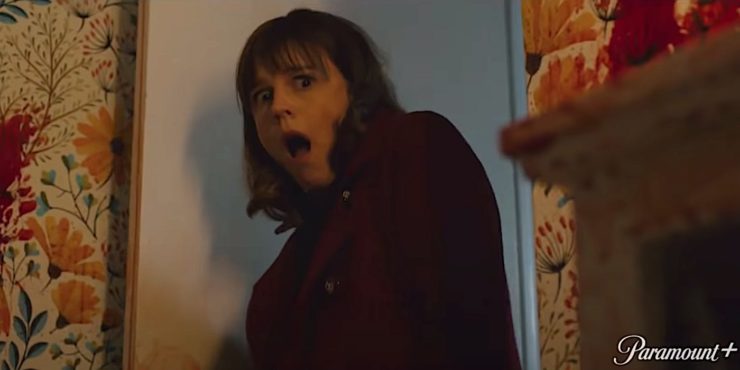
And then there’s the ending! The last two episodes give us Leland murdering a priest and then being, um, aroused by what he’s done; Andy’s probably brainwashed or cursed or something; Kristen turns to God in a panic and then regrets it; David lovingly cups Kristen’s face because he thinks it’s Demon!Kristen—he’s so discombobulated at this point that any lines between reality and vision are simply gone; Kristen’s missing egg has potentially been implanted in Leland’s new girlfriend; Lynne might want to be a nun??? Oh, and Sister Andrea wanders through Kristen’s home killing demons with a shovel.
Each time I thought the show had reached its peak, in true Bouchard fashion it found a new batshit mountain to climb.
OK, it’s safe to come back, I’ll stop with the spoilers.
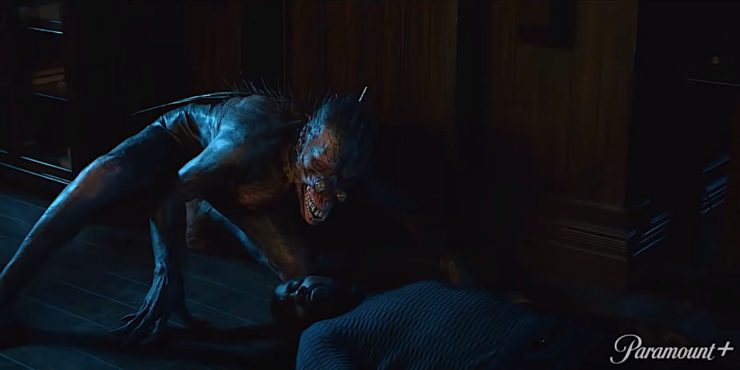
But I’ve talked about all this and I haven’t even gotten into the fantastic creatures Evil has! Joel Harlow fills the show with really eye-popping human-ish-demons, goat-demons, baby demons, demon babies—but you don’t have to take my word for it.
I fear I’ve fallen into my usual habit regarding this show, and I’m just yelling plot points at anyone who’ll listen, so allow me to end with an attempt at nuance. Evil has, for three seasons running now, used a unique lens to dig into complex societal issues, capital letter things like Race, Gender, The Internet, Social Media, Parenting, while treating the issues with delicacy and nuance. It’s also not afraid to be genuinely horrific at times, or to go for a ridiculous, punny joke. And maybe best of all, it’s a good faith example of showing many different takes on these issues. Most of the representatives of the church are conservative, but they’re never presented as cartoonish or stupid. At the same time, the show never implies in any way that Kristen needs to change or to meet them halfway. It shows that Ben, faced with what he thought was certain death last season, recites prayers in Arabic, but also that he treats his sister’s faith with respect, but also that he still personally finds religion ludicrous. David’s libido didn’t die when he became a priest. His faith didn’t somehow become unshakeable. But he’s still working to be the best priest he can be, even when he wobbles. People are complex, their motivations often unknowable, and Evil makes space for all that complexity, and also includes moments like a creatively-blocked wannabe writer yells “Fuck you, Satan!” because his incantation isn’t working.
As I said, perfect television.
Leah Schnelbach is delighted to have an excuse to say “I love Evil!” more than they already did. Come coo over adorable demon babies on Twitter!










